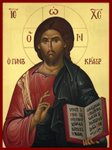ADDENDUM: I realized that I used names for the theory that most people might not be familiar with (I wasn't). You might know it under a type of source criticism or, more likely, as the JEPD Theory. Yep, this is the one where there are different sources for the books of the Pentateuch commonly known as the Yahwist (J), Elohist (E), Priestly (E), and Deuteronomic (D) editors. I hope that helps bring it to your mind as we discuss it.
I am always reluctant to post anything directly from the classes that I am taking at the ITI mainly due to the fact that one class does not an expert make :). It takes a heckuva lot more than one class to really get a grasp of the subject and to understand the subject that one writes about. The blogosphere is packed full of people going off half-cocked about which they know just enough to be dangerous. In some ways, this next series of posts falls into that category. I am not an Old Testament scholar in any way, shape, or form. However, I feel the importance of the subject is such that, at the minimum, I should pass on the information. Of course, I won't be able to help adding some commentary and thoughts of my own along the way. :-) Since I am not an Old Testament scholar, I will not be able to forward an alternative theory from my own work. I will, however, present an alternative from someone who is a scholar. My intention is not to solve the problem as much as cast substantial doubt on the theory as such. Furthermore, I want to explore and attempt some analysis of the philosophical underpinnings of the theory. I think a critical reflection on these philosophical foundations will help us understand how the theory developed and hopefully will shed light on the philosophical presuppositions we have about Scripture. We all have them. NO ONE IS COMPLETELY OBJECTIVE. Thus, we must identify and understand them so that we can be as objective as possible. (I DO NOT hold that to be objective one must set aside faith. In fact, I firmly believe that theism (specifically the fullness of Catholic orthodoxy) is the only true, objective position since it is the one that corresponds with reality. I'll have more to say on this later...). So let's jump in!
Anyone that has studied the Old Testament seriously, in any manner whether in the parish or in academia, has been exposed to the Graf-Wellhausen Documentary Theory (from now on known as the GWDT). Most material, especially used in “popular” Bible studies, treats the GWDT as unassailable fact[1]. Most importantly, the introduction to the Pentateuch in the English translation of the New American Bible treats the GWDT as simple fact[2]. The presence of the GWDT in the “official” American Catholic Scripture translation raises it to the near magisterial level in the minds of most English speaking Catholics. It is interesting that the author(s) of the Navarre Commentary and The Consuming Fire readily admit that there is no physical or archaeological evidence whatsoever to corroborate the GWDT, and yet it is still treated as fact[3]. Even a brief perusal of the literature concerning Old Testament scholarship would make manifest the serious questions with regards to whether the GWDT has any correlation with the truth of the matter. Therefore, it is my intent within these several blogs to give the historical background of Old Testament scholarship, especially surrounding the formation of the GWDT, the major criteria on which it is founded, an alternate explanation concerning those criteria, an alternate view of Pentateuchal authorship and development, and, finally, I will offer some closing thoughts in the way of a summary focusing especially on the philosophical mindset whereby the GWDT came into existence and by which it has been propagated for nearly two centuries.
Old Testament criticism has been a feature of Christianity from its very beginnings. The Church Fathers understood the necessity to establish the text and to determine its meaning because the primordial Church found herself defending, not only her teaching, but the Jewish Scriptures from whence she was born and that she fulfilled[4]. Mosaic authorship of the Pentateuch was questioned already in the mid-second century by Ptolemy[5]. Ptolemy concluded that the books of the Pentateuch were compiled by Moses from sources that came from God and other Elders. The heretic Marcion (+160) posed the greatest early challenge to the Old Testament[6]. He rejected the entire Old Testament as describing a lesser evil god[7] that was “weak, unjust, lacking in prescience, and essentially fickle”[8]. This was the first of a long line of Scriptural critics who read their ideology into the Scriptures by using subjective criteria[9]. The first example of altering the traditional date of composition due to an anti-supernatural bias is attributed to Porphyry (+303)[10]. He asserted that Daniel did not write the Book of Daniel because Porphyry did not believe Daniel could predict the future in such minute detail. Thus, he believed that it was written during the time of Antiochus IV Epiphanes (175-163 B.C.)[11] because it was contemporary with the events described in Daniel[12]. This isn’t to suggest that all Biblical criticism is somehow bad.
The middle ages saw a shift of attention from primarily an apologetic stance to searching the Scriptures for and commenting on allusions to the Church using allegorisms[14]. There were isolated occurrences of individuals calling into question the unity, and/or Mosaic authorship of the Pentateuch throughout the Middle Ages. According to Robert and Feuillet, the movement of biblical criticism began with Ibn Ezra in the mid-twelfth century when in his commentary on the Pentateuch he called into question several aspect of the Biblical texts due to their apparent contradictions e.g., the iron bed of the Og the King of Bashan[15]. Ibn Ezra and Bishop Tostatus of
Next time, well continue with the Protestant Reformation and should get through the positing of the GWDT...
[1] The
[2] The New American Bible: The Pentateuch,
[3] Duggan, 58; The author does state in a parenthetical sentence. “We must admit, however, that archaeologists have not discovered written sources of the Pentateuch. Thus we have only a hypothetical model constructed by scholars to explain the formation of the Pentateuch (Duggan,59, emphasis mine).” However, the author never mentions any of the serious disagreements or concerns about the GWDT.
[4] Robert, A. and Feuillet, A., Introduction to the Old Testament,
[5] Harrison, R.K., Introduction to the Old Testament,
[6] Ibid
[7] Livingstone, E.A.,
[8]
[9] Ibid
[10] Livingstone, 459.
[11]
[12] I note that the introductory note to the NAB dates Daniel to the same time for the essentially the same exact reasons as Porphry does.
[13] Robert and Feuillet, 80.
[14] Ibid
[15] Robert and Feuillet, 81; Dt 3:5 “(For only Og the king of
[16] Ibid.



No comments:
Post a Comment